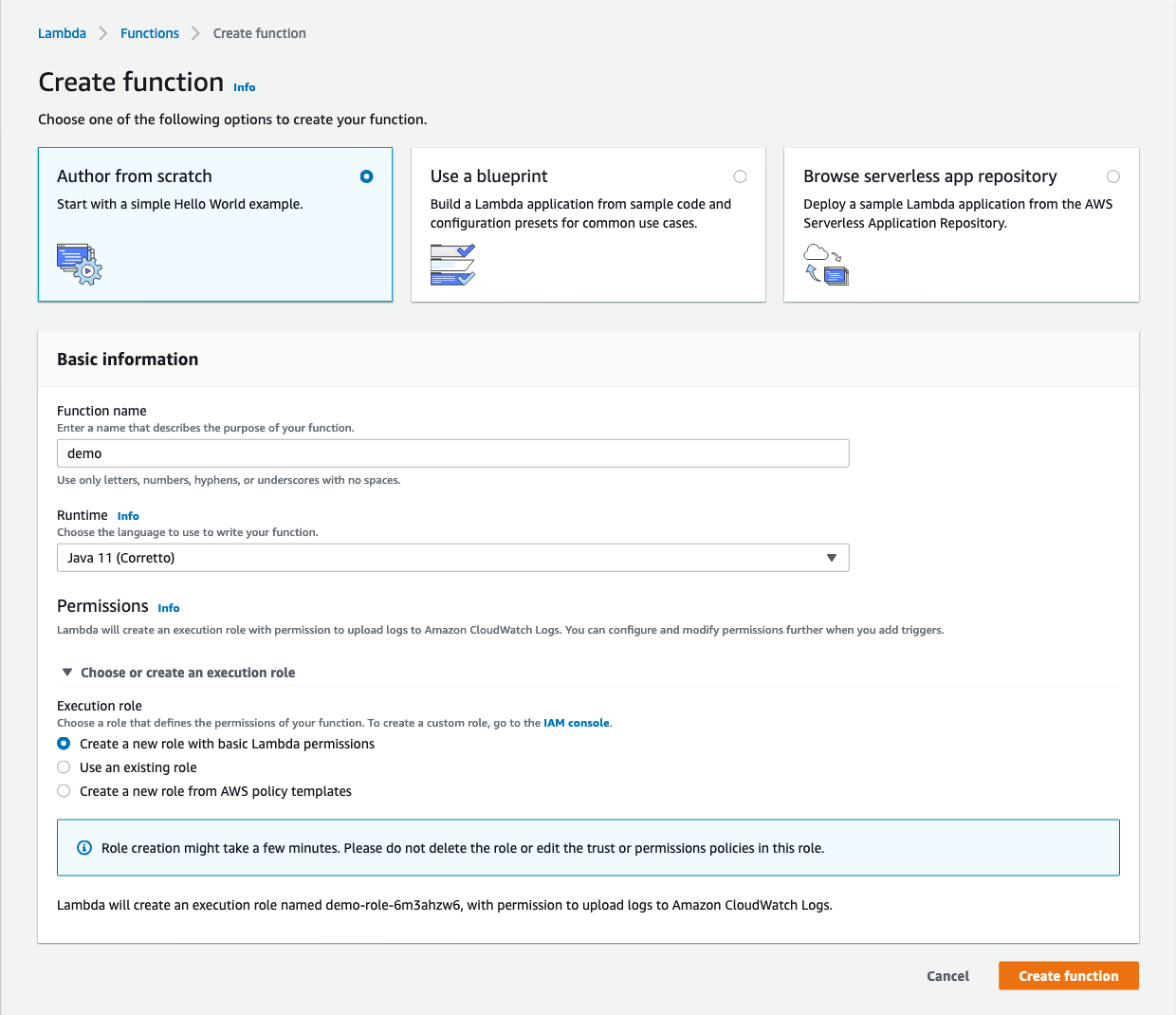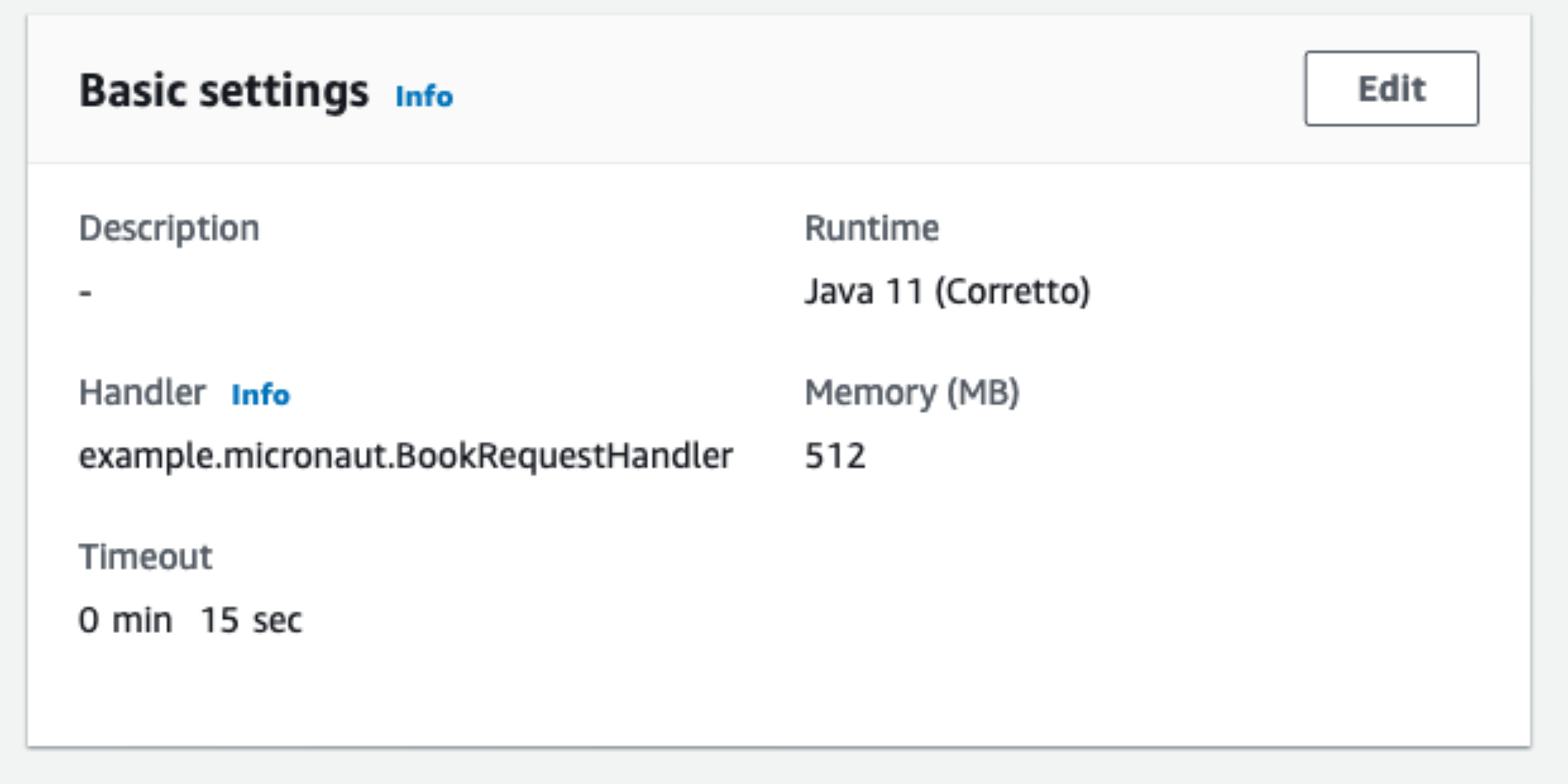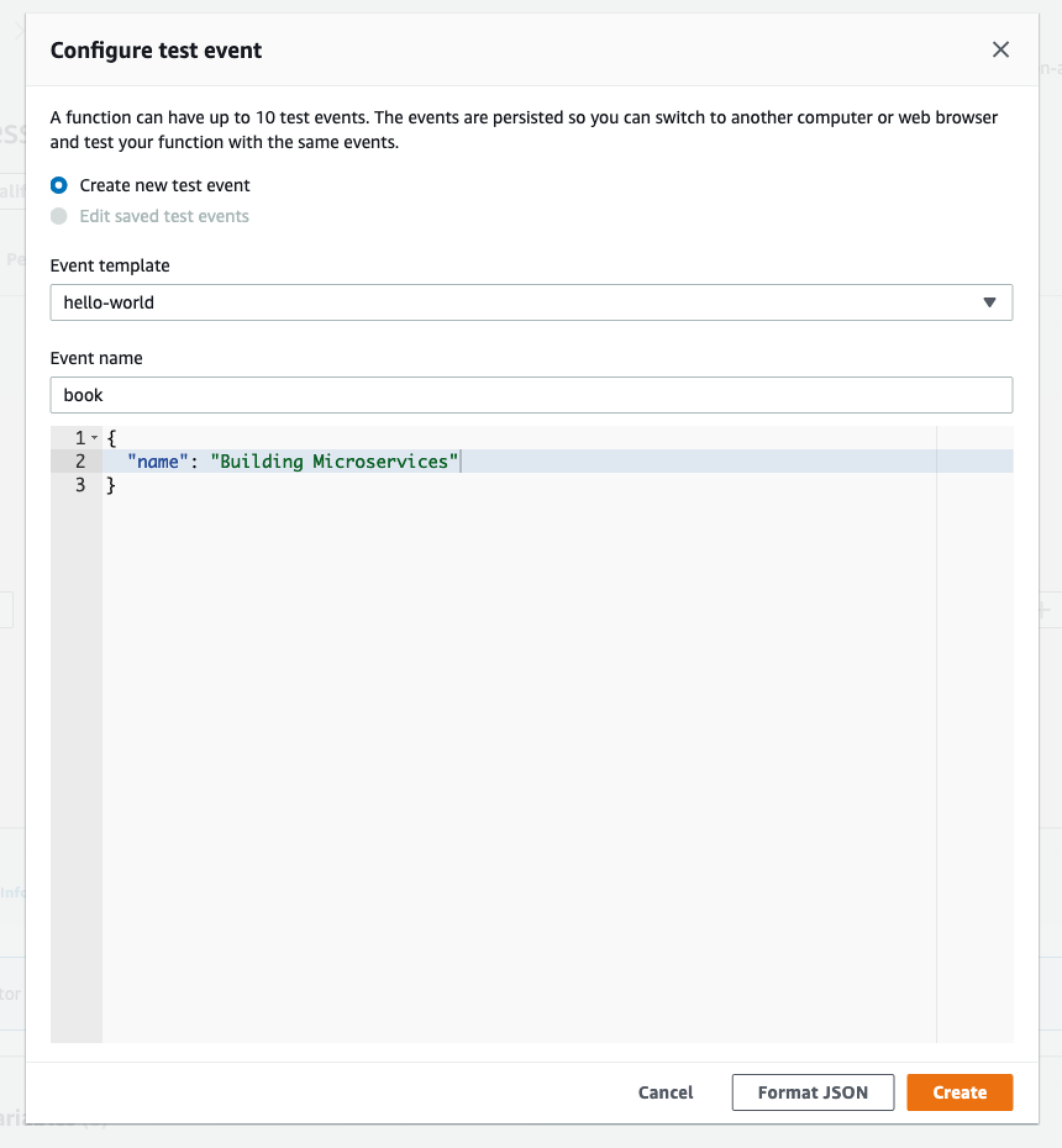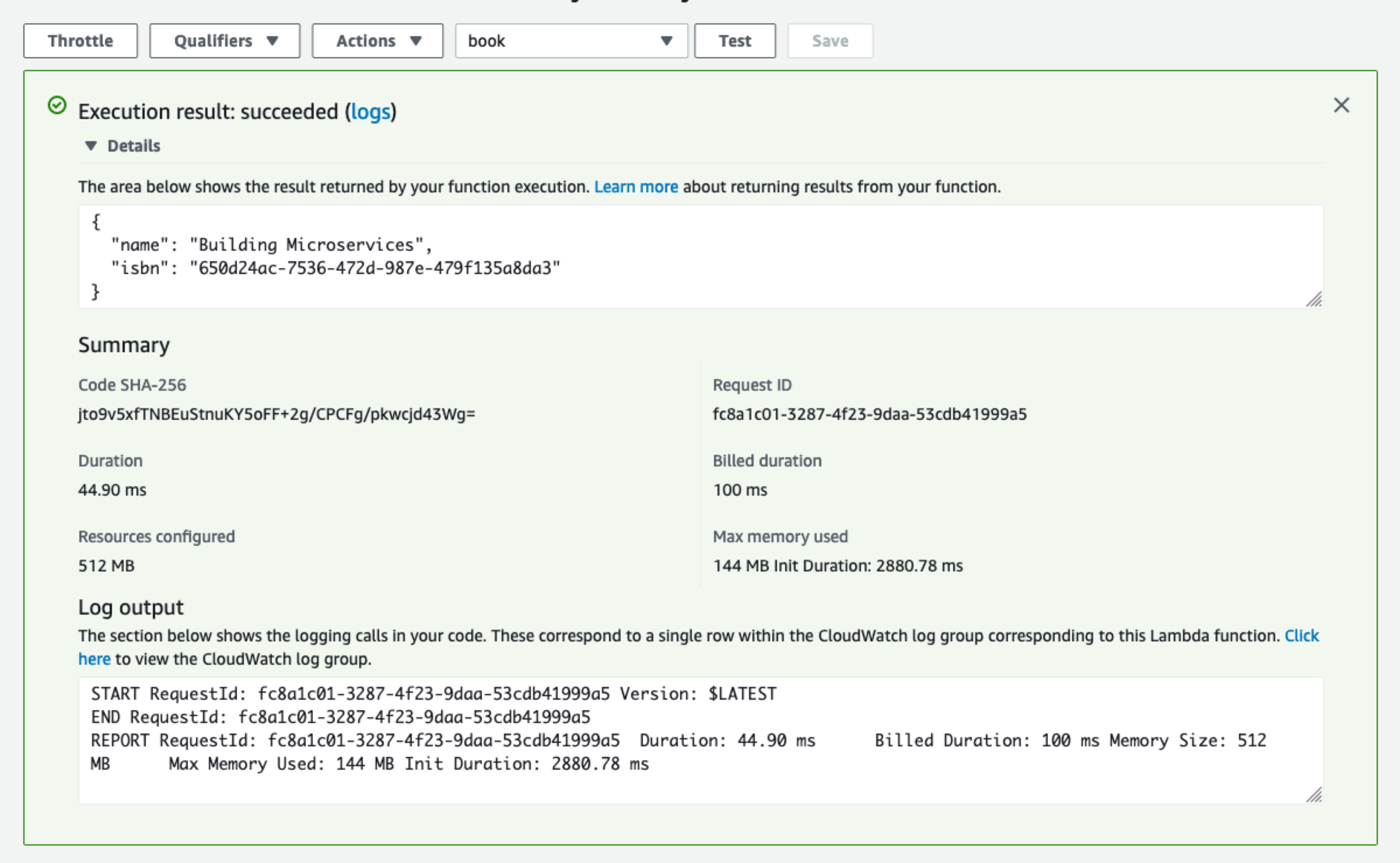Deploy a Serverless Micronaut function to AWS Lambda Java 11 Runtime
Learn how to distribute a serverless Micronaut function to AWS Lambda 11 Runtime
Authors: Sergio del Amo
Micronaut Version: 2.0.1
1 Getting Started
Please, read about Micronaut AWS Lambda Support to learn more about different Lambda runtime, Triggers and Handlers and how to integrate with a Micronaut application.
If you want to respond to triggers such as queue events, s3 events or single endpoints you should opt to code your Micronaut functions as Serverless functions.
In this guide, we are going to deploy a Micronaut serverless function to AWS Lambda.
1.1 What you will need
To complete this guide, you will need the following:
-
Some time on your hands
-
A decent text editor or IDE
-
JDK 1.8 or greater installed with
JAVA_HOMEconfigured appropriately
You will need also an AWS Account.
1.2 Solution
We recommend you to follow the instructions in the next sections and create the app step by step. However, you can go right to the completed example.
-
Download and unzip the source
or
-
Clone the Git repository:
git clone https://github.com/micronaut-guides/mn-serverless-function-aws-lambda.git
Then, cd into the complete folder which you will find in the root project of the downloaded/cloned project.
2 Writing the App
Create a micronaut application with the aws-lambda feature using the CLI:
% mn create-function-app example.micronaut.complete --features=aws-lambdaor use Micronaut Launch

2.1 Code
We want to support a JavaBean as input and output types.
The input is a Book object:
package example.micronaut;
import edu.umd.cs.findbugs.annotations.NonNull;
import io.micronaut.core.annotation.Introspected;
import javax.validation.constraints.NotBlank;
@Introspected (1)
public class Book {
@NotBlank (2)
@NonNull (3)
private String name;
public Book() {
}
@NonNull
public String getName() {
return name;
}
public void setName(@NonNull String name) {
this.name = name;
}
}| 1 | Annotate the class with @Introspected to generate the Bean Metainformation at compile time. |
| 2 | name is required |
| 3 | Add a nullability annotation to help with Kotlin interoperability and help the IDE. |
The output is a BookSaved object:
package example.micronaut;
import edu.umd.cs.findbugs.annotations.NonNull;
import io.micronaut.core.annotation.Introspected;
import javax.validation.constraints.NotBlank;
@Introspected (1)
public class BookSaved {
@NotBlank (2)
@NonNull (3)
private String name;
@NotBlank (2)
@NonNull (3)
private String isbn;
public BookSaved() {
}
@NonNull
public String getName() {
return name;
}
public void setName(@NonNull String name) {
this.name = name;
}
@NonNull
public String getIsbn() {
return isbn;
}
public void setIsbn(@NonNull String isbn) {
this.isbn = isbn;
}
}| 1 | Annotate the class with @Introspected to generate the Bean Metainformation at compile time. |
| 2 | name and isbn are required |
| 3 | Add a nullability annotation to help with Kotlin interoperability and help the IDE. |
The application contains a class extending MicronautRequestHandler
package example.micronaut;
import io.micronaut.core.annotation.Introspected;
import io.micronaut.function.aws.MicronautRequestHandler;
import java.util.UUID;
@Introspected
public class BookRequestHandler extends MicronautRequestHandler<Book, BookSaved> { (1)
@Override
public BookSaved execute(Book input) {
BookSaved bookSaved = new BookSaved();
bookSaved.setName(input.getName());
bookSaved.setIsbn(UUID.randomUUID().toString());
return bookSaved;
}
}| 1 | The class extends MicronautRequestHandler and defines input and output types. |
The generated test shows how the verify the function behaviour:
package example.micronaut;
import static org.junit.jupiter.api.Assertions.assertNotNull;
import static org.junit.jupiter.api.Assertions.assertEquals;
import org.junit.jupiter.api.AfterAll;
import org.junit.jupiter.api.BeforeAll;
import org.junit.jupiter.api.Test;
public class BookRequestHandlerTest {
private static BookRequestHandler bookRequestHandler;
@BeforeAll
public static void setupServer() {
bookRequestHandler = new BookRequestHandler(); (1)
}
@AfterAll
public static void stopServer() {
if (bookRequestHandler != null) {
bookRequestHandler.getApplicationContext().close(); (2)
}
}
@Test
public void testHandler() {
Book book = new Book();
book.setName("Building Microservices");
BookSaved bookSaved = bookRequestHandler.execute(book); (3)
assertEquals(bookSaved.getName(),book.getName());
assertNotNull(bookSaved.getIsbn());
}
}| 1 | When you instantiate the Handler, the application context starts. |
| 2 | Remember to close your application context when you end your test. You can use your handler to obtain it. |
| 3 | Invoke the execute method of the handler. |
3 Lambda
3.1 Create Function
Create a Lambda Function. As a runtime, select Java 11 (Correto).

3.2 Upload Code
Generate a FAT JAR of your app with ./gradlew shadowJar and upload it.

3.3 Handler
As Handler, set:
example.micronaut.BookRequestHandler

3.4 Test
You can test it easily.

You should see a 200 response:

4 Next Steps
Read more about Micronaut AWS Lambda Support
